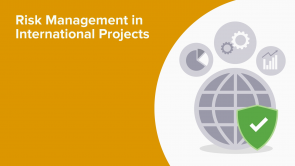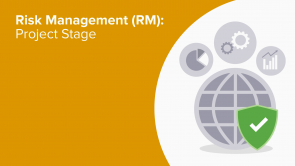Project Management Fundamentals

About the Lecture
The lecture Project Management Fundamentals by Simone Hoferer is from the course Risk Management in International Projects. It contains the following chapters:
- Objectives
- Project phases
- Project phases in international projects
- Project phases & risk burden
- Purpose of risk management
- Correction of faults
- Requirements during the project
- The magic triangle
- Local interests
- How to deal with conflicts
Included Quiz Questions
What are the phases of (international) projects?
- Definition/ offer, planning/ engineering, production/ sourcing, transport/ logistics, installation/ launch, delivery & handover and warranty
- Demolition/ offer, planning/ engineering, production/ sourcing, transport/ logistics, installation/ launch, delivery & handover and warranty
- Definition/ offer, planning/ engineering, proposal/ sourcing, taxi/ logistics, installation/ launch, delivery & handover and warranty
- Definition/ offer, planning/ engineering, production/ sourcing, transport/ logistics, instruction/ launch, delivery & handover and warranty
At which point in the project is the highest project risk? It is ...
- at the very beginning (income of order) because at this point the uncertainty in the outcome of the project is highest.
- towards the end of the project since all problems and hazards are likely to accumulate.
- during the warranty stage since all hidden defects, quality flaws and problems become obvious.
- during the engineering stage since here each mistake will have tremendous financial impact on the production.
How does the effort on correcting mistakes develop during the course of project?
- The effort of correcting mistakes increases exponentially from stage to stage the later it is taken care of.
- The effort of correcting mistakes increases linear from stage to stage.
- The effort of correcting mistakes decreases exponentially from stage to stage.
- The effort of correction of mistakes depends on the mistake itself, not when it is corrected.
What is the duty of risk management in projects? Its duty is ...
- to minimize the project risk by identifying potential dangers and opportunities as early as possible in order to take appropriate measures.
- mainly to control processes and to communicate risks.
- to analyse and record problems retrospect after project completion.
- to make sure that the project is categorized properly regarding the level of risk: low risk - high risk.
What are (amongst others) additional requirements for a project manager in international projects ?
- Intercultural competence and language skills
- High social competence, friendliness and to like and respect (strange) people
- Ability to deal with various and complex issues like customs, logistics, import & export regulation, global politics, foreign currencies
- General management skills and organizing ability
Which aspects form the limits of international projects?
- Time frame
- Cost frame
- Quality frame
- Local interests
- Quantity frame
What do you need to consider when taking a look at local interests?
- Local companies have their own interests. They want to feed their own network.
- The interests are not immediately obvious to foreigners.
- As a foreigner you might sometimes hurt national pride with your behaviour.
- The locals might check your performance more closely.
- As a foreigner you will probably encounter dishonesty as well as a lack of hospitality.
How can you deal with conflicts of interests?
- Be polite, steady and friendly.
- Communicate and document.
- Agree upon priorities.
- Ensure transparency in the project goal.
- Make the other side adapt to your behaviour.
Customer reviews
5,0 of 5 stars
| 5 Stars |
|
1 |
| 4 Stars |
|
0 |
| 3 Stars |
|
0 |
| 2 Stars |
|
0 |
| 1 Star |
|
0 |
1 customer review without text
1 user review without text
Excerpts from the accompanying material
... with the individual phases of a project and to understand their characteristics. To clarify the various demands on the role of ...
... project goal, costs, kind of project, scope of work. A. order: decision project yes/no II. planning: ...
... definition/offer 2 = planning/engineering 3 = production/sourcing 4 = transport/logistics 5 = installation/launch ...
... international projects (1): 25 1. offer: defining the project goal, kind of project, scope of works, conditions, ...
... installation: installation & launch 6. handover: of project, documentation, acceptance report, training, closing invoice 7. Warranty: period ...
... To help to identify unexpected and uncertain turn of events as early as possible (best before their appearance) and to ...
... about the project: Endurance, high capacity, relatively stress resistant ...
... international projects: •Intercultural competence •Good language skills (minimum English) and understanding for language difficulties •High flexibility •Good social ...
... various & different interests of involved stakeholders in international projects. ...
... local interests, to feed their own network of acquaintances, friends, family •Often the interests are not immediatedly obvious for ...
... documentation > Clarification & call for decisions > Diplomacy & negotiating skills > Cultural ...





